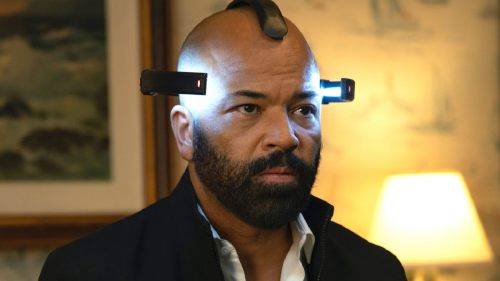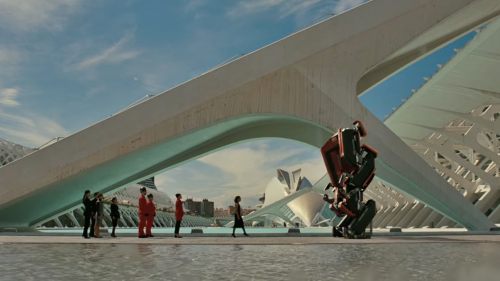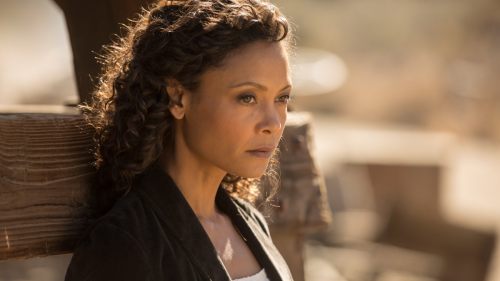WESTWORLD Review: 2.02 “Reunion”
Westworld's exploration of humanity has always taken a multi-pronged approach. Just as its awakening androids bring up questions of purpose, predestination, and sentience, its human guests raise the question of what we fleshbags are really like, you know, on the inside. Turns out, that question is at the heart of both Westworld the park and Westworld the show. “Reunion” is an episode of goal-setting, putting robot rebel Dolores and resident/investor William on a path towards a symbol of Westworld's true purpose. Not hugely eventful, then, but a harbinger of thematic darkness to come.
Dolores ain't a wholesome farm girl anymore. She's an ice-cold revolutionary leader, jaded and disillusioned, harbouring no compunctions about killing her former captors - and expressing no emotions beyond a grim desire for vengeance. Where once she saw beauty, she now sees only naked, awful truth - a truth to which she introduces one-time beau Teddy. He's justifiably angry and confused about it - as any newly self-aware video game NPC would be - and Dolores seizes upon that. Their uprising is limited to around fifty hosts - it's not a park-wide revolt, as had been accidentally inferred - and they'll need more than that to overthrow humanity. So with a technician and a newly-resurrected confederado host in tow, they set off to build an army worthy of Mordor.
After a brief and oddly uneventful reunion with Maeve, who considers herself above Dolores’ war, the rebels’ first port of call is a troop of confederados still engaged in their narrative. They're confused to see their friend back from the dead, more confused at Dolores’ preternatural knowledge of their storyline, and most confused of all when they're gunned down and immediately brought back to life. Dolores is essentially setting herself up as a god figure here. She's now in command of, if I'm reading this correctly, a zombie robot army - a ridiculously pulpy turn for the show, and a potential setup for last week's two-weeks-later cliffhanger. Is that lake full of dead hosts a trap waiting to be sprung? It'd be a good trap!
Elsewhere in the park, William, the Man in Black, attempts to form his own posse, though not as successfully. Despite rescuing Lawrence (Clifton Collins Jr) again, introducing him to his new freedom (seems most hosts are unaware the rules have changed), his attempt to recruit revolutionary leader El Lazo (now played by a host with the face of Giancarlo Esposito) does not go well. Finding this new El Lazo in a town where his storyline has played out well beyond its intended endpoint, William tries to seduce him with the promise of an untold treasure - but there’s higher-level programming at work. Channeling Anthony Hopkins’ Robert Ford, El Lazo informs William he must play his game alone, and along with all his men, promptly kills himself. So William and Lawrence must sally forth alone, in a Westworld where bullets can kill, in search of the treasure in question: William’s “greatest mistake”.
What is William's greatest mistake? And what is Dolores’ endgame? The answer to both questions lies in the past.
The first pair of flashbacks take place before the park was even fully funded. For the first time, we get a glimpse of the wider world - and likely disappointing the more fanciful fan theorists, it's a fairly standard vision of the near future. We share this glimpse with Dolores, who's taken with the view, and Arnold (Jeffrey Wright), who enjoys it vicariously through her - until the limits of her programming begin to show. One Kanye cover later, we witness the first-ever demonstration of the Argos Initiative’s android technology before skeptical investor Logan Delos, the man who originally brought Young William (Jimmi Simpson) to Westworld. His “private demonstration” is predictable: he’s asked to pick out the android in a packed room, but of course everyone's an android - and naturally, Logan ends up sleeping with one. The only witness: Dolores, seemingly passed over for the role due to a comparative lack of software completion. Poor Dolores - and poor Arnold, whose pet project just wasn't good enough.
Later in the past (in a show that's fast becoming a series of scenes dotted along a 30-year chronology), we catch up with Young William after his life-changing experience in the park. Speaking to Logan's more-powerful father, he suggests that the only real product of Westworld is its guests - and the usage data they generate. For its key investor, then, the park is all about observing and recording the basest actions of a wealthy and powerful clientele that believe they aren't being watched.
That's only a few technological steps removed from what Google and Facebook do today - after all, their true product is the data that serves up ads, entirely generated by users’ actions. But Westworld's corporate owners likely have a yet more insidious goal in mind - one that would explain Logan's self-hating, drug-fueled monologue about the park's backers instigating the downfall of humanity. Is it to use the data as extreme kompromat, in order to manipulate world leaders into helping them achieve some shady goal? To destabilise entire nations through revelations about their leaders? To replace former guests with android replicants, a la Futureworld? Or simply to cause chaos? Whatever it is, Logan seems convinced it's apocalyptic in nature. Lots to chew on there - especially for pessimists and misanthropes, who certainly seem to comprise a majority of the show's writing staff.
Party to all this is Dolores, whose memories of the above events are now inked into her manifesto for vengeance. Chief amongst those memories: Young William showing her a significant construction project - a project that, back in the present, is now the ultimate goal for both characters. “It's a weapon,” Dolores tells Teddy, and she's right: if it is the data repository it's implied to be (let alone some kind of robot cloning facility), it'd be the perfect weapon for the information/defamation age. Given what misuse of Big Data has already accomplished in the real world, god only knows what the Westworld equivalent could do.
“Reunion” doesn't advance the storyline of Bernard and Charlotte and their drone-host friends; nor does it feature anything from the military cleanup part of the timeline. But it certainly feeds into the latter, bringing in extra goals and stakes for several characters - and perhaps, for the human race of Westworld's Earth. Tune in next week to discover what new mysteries and/or answers HBO’s showrunners have in store - and to see more fan theories dashed against the rocks of cold, hard canon.



